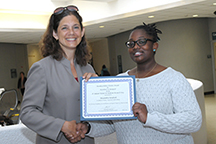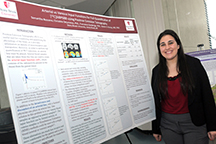
April 28, 2014 - Two biomedical engineering interns — Alexandria Kendrick and Samantha Rossano — presented posters at the 8th Annual Women in Medicine Research Day sponsored by the School of Medicine’s Office of Faculty Development. Both are interning in the department’s Center for Understanding Biology using Imaging Technology (CUBIT).
Ms. Kendrick’s poster, titled “Test-Retest Reliability of Cortical Thickness in a Multi-Site Study” presented work conducted by the CUBIT team under the direction of Christine DeLorenzo, PhD, the Center’s Director. This work represents one facet of the search for a reliable biological marker for mood disorders. Previous MRI studies have demonstrated an association between reduced cortical thickness in regions of the brains of depressed subjects versus those of healthy controls. Before these measures can be used to diagnose depression or measure response to treatment, their reliability must be established and understood. Ms. Kendrick’s poster suggested that although these measures show promise they should be used with caution, especially in studies of smaller regions of the brain. Ms. Kendrick was awarded a certificate for the best abstract by a trainee and she was invited to give a 10 minute talk at the conference.

Ms. Rossano’s poster, titled “Arterial vs Venous Input Functions for Full Quantification of [11C]ABP688 using Positron Emission Tomography,” presented one aspect of the Center’s study of the glutamate receptor system, conducted under the direction of Dr. DeLorenzo and Francesca Zanderigo, PhD. The CUBIT team is seeking to make PET easier, less costly, and more accessible by developing non-invasive approaches to PET quantification. The goal of the study presented by Ms. Rossano was to determine the relationship between PET outcomes calculated using arterial versus venous data. If a consistent relationship can be established, the need to use uncomfortable and invasive arterial lines to achieve full quantification of PET images may be eliminated. After analyzing images from 9 subjects, the CUBIT team identified a consistent linear relationship between arterial and venous data at 12 minutes into the studies of all 9 subjects, suggesting that some day full quantification may be possible using venous sampling. The authors caution, however, that further studies are need to identify the causes of variability across subjects.
Ms. Kendrick is a recent graduate of the State University of New York at Binghampton, where she earned a bachelor’s degree in biomedical engineering. After completing her internship with the CUBIT team, she plans to enroll in a doctoral program in biomedical engineering and eventually pursue a career in research and teaching.
Ms. Rossano is a junior biomedical engineering major at Stony Brook University who is planning to attend medical school after graduation.
Both Ms. Kendrick and Ms. Rossano were provided internships through a program called “Recruitment of Women in BME through Mentored Internships in Neuroimaging.” This program, directed by Dr. DeLorenzo, encourages women and students from underrepresented minorities to pursue careers in engineering. The program is funded through Stony Brook University’s Presidential Mini-Grants for Departmental Diversity Initiative. Members of the CUBIT faculty provide the interns with mentoring and support.